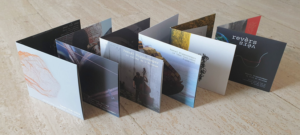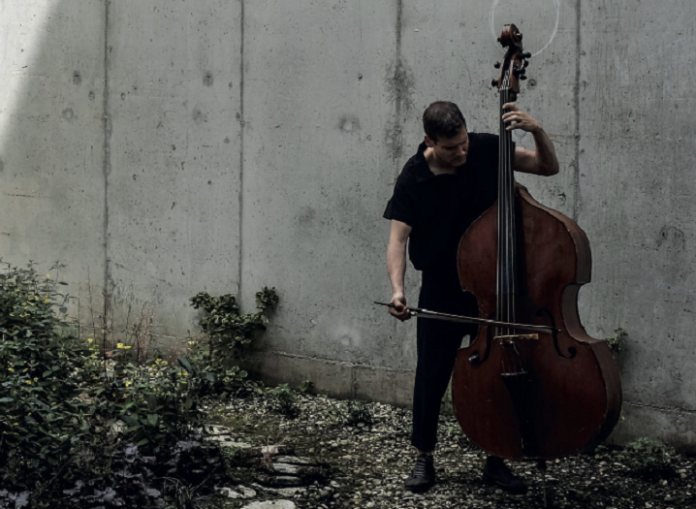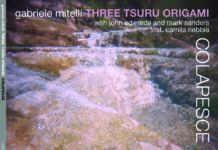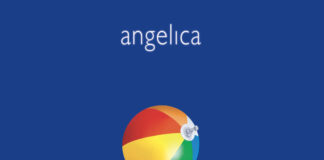One of the fundamental principles animating much 21st century music, whether improvised or composed, is the creative integration of an expanded field of sound or sound-producing gestures into the basic fabric of the work. In his improvised as well as composed work, double bassist/composer Pascal Niggenkemper actively explores the possibilities this principle has opened up. A six-CD set documenting his music of 2017-2022 shows how he is able to realize these possibilities in a variety of contexts ranging from solo double bass matched against a robotic prepared double bass, to a work for nine musicians, two dancers, and poet. Where to begin?
Because Niggenkemper is above all a double bassist, that instrument quite naturally serves as the anchor for all of these recordings. Consequently, the place to start is with La vallée de l’étrange (1). Recorded in July and October of 2022, the disc contains a performance for Niggenkemper on solo double bass in duet with an amplified prepared double bass augmented with motors, which allow it to operate autonomously. Through Niggenkemper’s projection of his real time choices into the flux of the automated bass’ sounds, there emerges an oblique yet essentially mimetic relationship in which both the human and the robotic voices recognize themselves in each other. Beyond this mimetic dimension, these performances take us directly to Niggenkemper’s root concern with extending the instrument’s spectrum of sounds. He accomplishes this here as in much of the other recordings not only by supplementing the bass’ material resources with various preparations, but by inventing and leveraging novel techniques for playing it. The resulting sounds are, as the title suggests, uncanny.
Along the same lines as La vallée de l’étrange’s experiments with amplification and motorization is Beat the Odds, a recording for two cellos, two double basses, amplifiers, and motors. The four players – which include, in addition to Niggenkemper on double bass, cellists Elizabeth Coudoux and Ricardo Jacinto and double bassist Félicie Bazelaire – are situated in a square facing each other; behind each is a bass amplifier for a quadrophonic, environmental effect. The four instruments are miked and modified by having motors mounted on their bridges, which drive levers that hit the strings in variably pulsing patterns. The effect is to generate rhythms and drones in changing combinations. Given the massing of low-register instruments, the collective sound settles into darkly opaque, dense textures broken by gaps and the rattlings of the levers against the strings. Each of the six performances realizes this sound in its own way, such as in the quasi-gamelan music of Menuiserie, the irregular stop-start rhythms of Caldas de Rainha, and the harsh industrial ambience of Aven Armand.
Le 7ème continent, from 2017, is another album of work for electroacoustic chamber ensemble; it too features some doubling of instrumentation. The group here is .Kipppunkt, consisting of Niggenkemper on double bass, Julián Elviraon flutes and electronics, Liz Kosack and Philip Zoubek on clavichord and synthesizer, and Joris Rühl and Joachim Badenhorst on clarinets and electronics; this is their second recording. Niggenkemper describes the album as containing music for “double trio or triple duo” – an apt characterization for this set of highly abstract compositions, given its predominantly textural focus. Massed sounds in changing combinations provide the point of departure here; layers of two or more instruments at a time overlap and move their centers of gravity toward and away from each other. As with much of Niggenkemper’s music, pulse is an important element; here it operates as much against as with the waves of sound that both ride it and push up against it.
With the remaining three releases, Niggenkemper introduces voices into the instrumental mix. Have You Ever Wondered, a suite of eleven pieces for the unusual combination of carillon (Corinne Salles), double bass (Niggenkemper), and trumpet, voice, and electronics (Ben LaMar Gay), was recorded on a hot day in July 2022, in a small room atop a tower 20 meters high. With its rhythmic tolling and long-decaying tones the carillon centers much of the music, at times with repeated figures around which Niggenkemper and Gay provide embellishments. The music ranges from the pure noise of teeter-totter to the more-or-less conventional song structure of sona – the stark contrast between which is emphasized by their being programmed back-to-back on the album. Perhaps because it is so unusually configured there is much variety in the trio’s repertoire of sounds, supplemented at times by ambient sounds that bring the occasion of the recording to life for the listener.
 Voice plays a leading role in vèrs – revèrs, a suite for double bass and eight voices, the texts for which were taken from the Occitan poetry of Jaumes Privet. It is a highly personal work for Niggenkemper, whose mother was from the region where Occitan, a southern French dialect also known as lang d’oc and Provençal, was spoken; he writes of having heard the dialect spoken by older people when he was growing up. Privet’s poetry is arranged for the vocal ensemble Voix en Rhizome, a group including men and women and one child; their delivery of the texts takes the form of a free polyphony of song and speech – of soliloquies, conversations, dramatic asides, arias sung simultaneously and independently, and the jumbled chatter of the crowd. In all instances Niggenkemper supports the vocalists with sensitive contributions on double bass. Alternating with the vocal pieces are double bass solos highlighting Niggenkemper’s fluency in advanced techniques and capacity to bring conventional and unconventional sounds together in a musically cogent way. It is a compelling recording on which Niggenkemper masterfully integrates the instrumental and vocal elements in the ensemble movements, and with his solo interludes joins the individual parts into an effective, and affecting, whole.
Voice plays a leading role in vèrs – revèrs, a suite for double bass and eight voices, the texts for which were taken from the Occitan poetry of Jaumes Privet. It is a highly personal work for Niggenkemper, whose mother was from the region where Occitan, a southern French dialect also known as lang d’oc and Provençal, was spoken; he writes of having heard the dialect spoken by older people when he was growing up. Privet’s poetry is arranged for the vocal ensemble Voix en Rhizome, a group including men and women and one child; their delivery of the texts takes the form of a free polyphony of song and speech – of soliloquies, conversations, dramatic asides, arias sung simultaneously and independently, and the jumbled chatter of the crowd. In all instances Niggenkemper supports the vocalists with sensitive contributions on double bass. Alternating with the vocal pieces are double bass solos highlighting Niggenkemper’s fluency in advanced techniques and capacity to bring conventional and unconventional sounds together in a musically cogent way. It is a compelling recording on which Niggenkemper masterfully integrates the instrumental and vocal elements in the ensemble movements, and with his solo interludes joins the individual parts into an effective, and affecting, whole.
Perhaps the most ambitious of these six releases is levar lenga, a mixed media set of fourteen pieces for a large electroacoustic chamber ensemble, voice, and dancers recorded in July 2021. Niggenkemper once again selects texts by Privet, and includes poetry by J.M. Pieyre as well; Privet recites his poems while Pieyre’s texts were delivered by the late René Duran, to whom the recording is dedicated. With its fleshed-out instrumental setting the suite feels like an expanded version of the more sonically austere vèrs – revèrs, albeit with an atmosphere and dramatic force uniquely its own.
___________________________________________
Note:
(1) There’s also a previous review in Percorsi Musicali written by Ettore Garzia (read it here).







